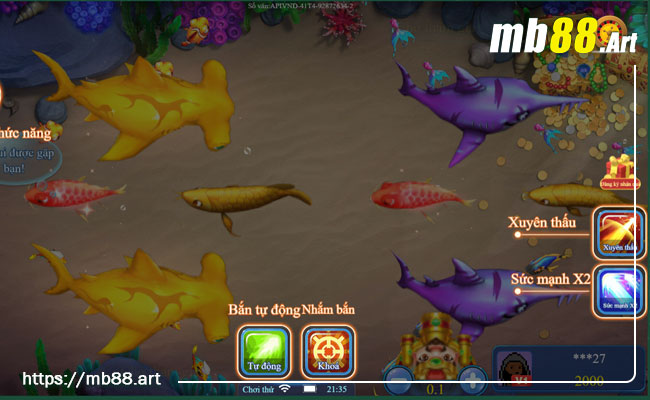MB88 | Sòng Bạc Trực Tuyến Số 1 Uy Tín – Ưu đãi Tân Thủ
MB88 hiện nay đã dần khẳng định vị trí của mình trong ngành giải trí đổi thưởng online tại các thị trường châu Á nói chung và Việt Nam nói riêng. Tham gia trang đổi thưởng hấp dẫn của chúng tôi, bạn chắc chắn sẽ có những trải nghiệm về các trò chơi online cực kỳ hấp dẫn đi kèm với mức thưởng khủng.
Tại các sảnh game của MB88, người chơi sẽ đắm chìm trong thế giới giải trí đổi thưởng với vô vàn những trò chơi hấp dẫn như: sảnh game bài, sảnh slot game, sảnh thể thao, sảnh bắn cá online,…
Giới thiệu những thông tin cơ bản về nhà cái Mb88
Thương hiệu MB88 là một trong những nhà cái khá nổi tiếng hiện nay. Nhà cái trò chơi đổi thưởng của chúng tôi đã được các tổ chức giải trí uy tín trên toàn thế giới cấp giấy phép hoạt động hợp pháp vào năm 2011 tại Manila – Philippines.
Sau khi trải qua quá trình hoạt động thì vào năm 2020, MB88 đã chính thức “trình làng” tại thị trường Việt Nam và được nhiều anh em ưu ái lựa chọn. Chúng tôi tự hào rằng luôn mang đến cho khách hàng tham gia tại MB88 những trải nghiệm cực “đã” khi tham gia với chúng tôi.
Người chơi có thể an tâm về độ uy tín của chúng tôi vì chúng tôi đã được cấp phép từ 3 tổ chức giải trí trực tuyến TOP đầu thế giới là: PAGCOR (Philippine Gaming and Entertainment Corporation), TST và BMM.
MB 88 ngày càng hoàn thiện sản phẩm đổi thưởng của mình nhằm đảm bảo sự trải nghiệm cho người chơi một cách tốt nhất. Ngoài ra, chúng tôi còn tăng cường thêm nhiều thể loại game vào kho game online của mình để thêm sự lựa chọn đa dạng cho người chơi.

Nhà cái Mb88 hoạt động ra sao?
Ngay từ khi thành lập, MB88 đã đưa ra mục tiêu hoạt động chính là mang đến những giây phút giải trí thoải mái nhất cho người chơi. Đồng thời có thể mang lại nhiều phần thưởng hấp dẫn nhất cho người chơi.
Nếu so với mặt bằng chung thì có lẽ Mb88 ra đời muộn hơn với những nhà cái tên tuổi khác. Tuy nhiên chúng tôi lại có những bước tiến vượt bậc và tạo nên một thương hiệu uy tín tại Việt Nam.
Chúng tôi luôn đặt tâm huyết của mình vào từng sản phẩm giải trí đổi thưởng, đầu tư hình ảnh, âm thanh chất lượng cao để người chơi trải nghiệm tốt nhất.
Mức độ hài lòng của khách hàng chính là động lực giúp cho MB88 tiếp tục phát huy, không ngừng cải tiến.
Những sảnh cược nổi tiếng tại MB88
Nếu như bạn chưa biết phải chọn trò chơi nào thì có thể tham khảo một vài sảnh cược hấp dẫn nhất tại MB88 nhé!
Sảnh game Live casino
Đây là một trong những sảnh game được người chơi ưa thích nhất tại nhà cái online. Tại đây bạn có thể tham gia các sảnh cược live casino như: AG, AE Sexy, Playtech, Dreamgaming,… và trải nghiệm những phút giây giải trí thông qua các trò chơi tại đây.

Sảnh game bài đổi thưởng
Tại sảnh cược này, người chơi có thể thoải mái chọn lựa game phù hợp với mình để chơi và chiến thắng. Những trò chơi cực HOT và hấp dẫn tại MB88 có thể nhắc đến như: blackjack, Sicbo, Baccarat, poker, pai gow poker, Rồng hổ,…
Chúng tôi sở hữu các nàng Dealer xinh đẹp, quyến rũ làm nhiệm vụ chia bài trong các ván bài để các ván đấu càng trở nên hấp dẫn hơn. Đặc biệt với hệ thống phát sóng trực tiếp, người chơi sẽ có cảm giác như mình đang thật sự tham gia ván đấu thực tế.

Sảnh cược slot game
Slot game là trò chơi đã quá quen thuộc với các bet thủ từ xưa đến nay. Với cách chơi dễ dàng và dễ trúng, sảnh game này cũng đã trở thành “gương mặt thân quen” mỗi khi cược thủ vào chơi tại MB88. Chúng tôi có hàng trăm game slot khác nhau với nhiều hình ảnh sắc nét, sống động cho người chơi lựa chọn.
Sảnh cược bắn cá online
Mặc dù trò chơi này chỉ mới xuất hiện khoảng chục năm trở lại đây nhưng bắn cá đã nhanh chóng chiếm được tình cảm của nhiều cược thủ. Chỉ cần có chút kỹ năng và may mắn, người chơi sẽ nhận về phần thưởng khổng lồ nếu như săn trúng Boss khủng. Ngoài ra, cược thủ còn có thể nhận về những phần thưởng cực lớn

Sảnh cược xổ số – lô đề
Với những ai thích trò chơi may rủi thông qua các con số thì không thể bỏ qua sảnh cược này. Tỷ lệ trả thưởng 1 ăn 99 chính là điểm mạnh giúp MB88 thu hút được nhiều người chơi chọn tham gia lô đề online tại nhà cái của chúng tôi.
Tại sao người chơi nên giải trí đổi thưởng tại MB88?
Chúng tôi sẽ đưa ra những lý do vì sao nhà cái của chúng tôi lại được ưa chuộng nhiều như vậy.
Thiết kế giao diện sang chảnh, đẹp mắt
Ấn tượng đầu tiên của MB88 với người chơi chính là một giao diện web cực đẹp mắt và sang trọng, tinh tế với màu xanh – vàng. Đội ngũ kỹ thuật của MB88 đã đầu tư cho sảnh game một nguồn vốn khá lớn.
Ngoài giao diện đẹp, các thao tác tại website cũng vô cùng đơn giản và nhanh chóng, thời gian load game cực nhanh và không lo sợ bị lỗi băng thông khi tham gia.
Sở hữu đội ngũ chăm sóc viên chuyên nghiệp nhất
Bất kỳ nhà cái nào cũng phải có đội ngũ nhân viên chăm sóc khách hàng, và MB88 cũng không ngoại lệ. Không những thế, chúng tôi tự hào rằng đội ngũ nhân viên hỗ trợ của chúng tôi vô cùng chuyên nghiệp, giải quyết nhanh chóng mọi thắc mắc của khách hàng.
Với sự đào tạo bài bản nhất, các nhân viên sẽ nhanh chóng hỗ trợ người chơi giải đáp mọi vấn đề khi tham gia đổi thưởng. Và bạn yên tâm rằng chúng tôi sẽ hỗ trợ bạn 24/7 kể cả những ngày nghỉ hay ngày lễ.
Mọi thao tác nạp rút đều nhanh chóng – an toàn
Trong quá trình giao dịch mà xảy ra vấn đề gì sẽ khiến bạn rất khó chịu đúng không nào? Yên tâm! Chúng tôi hiện đang cung cấp nhiều phương thức giao dịch khác nhau và đảm bảo độ an toàn cũng như giao dịch sẽ diễn ra một cách nhanh chóng nhất.
Nhưng hãy nhớ rằng phải cung cấp đúng thông tin giao dịch để tránh phát sinh vấn đề trong suốt quá trình giao dịch nhé!
App MB88 đã có trên điện thoại thông minh
Để người chơi thuận tiện hơn, chúng tôi đã có app trên điện thoại di động. Chỉ cần với vài thao tác tải app, người chơi ngay lập tức có thể tham gia vào game mọi lúc mọi nơi.
Nhưng bạn hãy nhớ tải đúng app của nhà cái MB88 là https://jobarneywrites.com/ nhé! Tránh trường hợp bị lừa đảo vào những nhà cái không chất lượng,
Hệ thống bảo mật tối tân
Độ bảo mật chính là điều mà nhiều người quan tâm khi tham gia tại các nhà cái. Chẳng ai thích thông tin cá nhân của mình xuất hiện tràn lan và bị người khác trục lợi.
Chúng tôi sử dụng hệ thống bảo mật mã hóa SSL 128 bit nhằm tránh việc bị các hacker xâm nhập. Các bạn hãy an tâm rằng chúng tôi chỉ sử dụng những thông tin mà bạn cung cấp để phục vụ cho mục đích cần thiết như đăng nhập, nạp/ rút,… và không giao dịch với bên thứ 3 nào khác.
Đồng thời, với mỗi thông tin cá nhân sẽ chỉ đăng ký được 1 tài khoản duy nhất tại MB88. Điều này sẽ tránh được trường hợp gian lận tại nhà cái và không công bằng với người chơi.

Những khuyến mãi lớn áp dụng tại nhà cái MB88
Chúng tôi luôn đưa ra những chương trình ưu đãi chào mừng tân thủ mới đăng ký nhận 88k cũng như khuyến mãi cho người chơi kỳ cựu tại MB88. Đặc biệt, Khuyến Mãi Hoàn 100% Nạp Đầu.

Tuy nhiên hiện nay đã có nhiều website giả mạo tên tuổi của MB88, người chơi nên cẩn thận trước khi quyết định đăng ký thành viên và nạp tiền. Đừng để mình trở thành những miếng mồi ngon của những kẻ trục lợi, lừa đảo.
Thông thường, các nhà cái lừa đảo sẽ đưa ra những mức khuyến mãi vô cùng khủng nhằm dụ dỗ người chơi nạp tiền, sau đó thì lặn mất tăm. Vì thế người chơi cần hết sức tỉnh táo nhé!

Tổng kết
MB88 là một trong những nhà cái trực tuyến hàng đầu Việt Nam hiện nay với sự đa dạng về sản phẩm giải trí đổi thưởng và các chương trình khuyến mãi hấp dẫn. Với uy tín và đáng tin cậy, chất lượng dịch vụ tốt và cơ hội trở thành đại lý, MB88 là một lựa chọn không thể bỏ qua cho những ai yêu thích thử vận động có thể trong trò chơi đổi thưởng trực tuyến.
Hãy tham gia ngay và trải nghiệm những điều tuyệt vời tại MB 88 nhé!
Một số từ khóa tìm kiếm liên quan khác: mb 88, m b88, mb888, casino mb 88, khuyen mai mb 88, the thao mb 88, uu dai mb88, link nha cai mb 88 …






